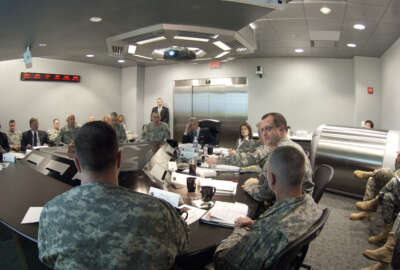
Military personnel chiefs want more flexibility in career paths, but not an end to ‘up-or-out’
Military personnel say DOPMA is foundationally sound, but needs more workarounds, especially for highly-technical fields
Subscribe to Federal Drive’s daily audio interviews on iTunes or PodcastOne.
Top personnel chiefs for the armed services said Wednesday that they supported increased flexibility in the primary law that dictates career and promotion paths for military officers, but cautioned against repealing the core features of the Defense Officer Personnel Management Act, such as its requirement that officers continually earn promotions according to an expected schedule in order to stay in the military.
The “up or out” principle, the officials said, has served the military well since DOPMA’s passage in 1980, but some of the services are eager to supplement it with other approaches to officer promotion, at least in some cases and in some career fields.
The Army, for instance, believes the current system is too constraining when it comes to recruiting highly-technical talent, such as cyber officers, said Lt. Gen. Thomas Seamands, the deputy chief of staff for personnel. While the Army has a pilot program underway to directly commission cyber experts from industry, it lacks the authority to onboard them at anything above its most junior officer ranks.
“We’re challenged to sustain some low-density, highly-technical specialties or specific skill populations within the larger branches,” he said. “The Army’s about people, and a review and adjustment to DOPMA would enable more efficient and effective management of human capital to help ensure inevitable cycles of reduction and expansion work more smoothly for the services. Our analysis tells us that while DOMPA is a solid framework, it would benefit from a review and adjustments to offer opportunities for managing key and critical skills with the officer grades to deal with today’s rapidly changing world.”
Likewise, the Navy thinks the current structure will continue to work fine for the majority of its officers, but would like to augment the traditional up-or-out system with other career paths that it calls “up and stay” — a mechanism for high-performing officers to remain in their current pay grade — and another called “up and bring back,” designed to ease transitions between active duty, reserve service, and the private sector.
Vice Adm. Robert Burke, the chief of naval personnel, said his service also believes it needs additional legal authority to pay officers based on their performance in order to incentivize and retain its brightest ones.
“All of these concepts of a merit based component to our pay are just completely lacking,” he said. “The current statutes, if you interpret them liberally, allow for a merit based component to some of the retention and enlistment bonus authorities, but not solely a merit based pay. I think we’re at the point where we need to change some statute.”
Although it cannot pay its officers based on their performance, the Air Force says it has already undertaken a process that’s intended to more closely align their promotions with their performance than with fixed schedules.
Lt. Gen. Gina Grosso, the Air Force’s deputy chief of staff for manpower, personnel and services said a review team is exploring various options for a revamped officer evaluation system. They include creating a separate “technical track” for officers — separate from the traditional system that’s designed to groom them to become commanders — and creating more “competitive categories” that separately manage officers in specialized fields.
A draft of those recommendations is currently awaiting approval by the Air Force’s senior leadership, and were based, in part, by similar reforms the service established within its enlisted force three years ago.
“Building on that success, we are now turning our focus to officer evaluation and promotion processes,” Grosso said. “DOPMA flexibility, such as affording officers the option to opt-out of promotion, increased authority regarding constructive credit, and improving permeability between the active and reserve components will greatly assist our efforts.”
The service officials were reluctant to provide detailed lists of the ways in which they believe DOPMA should be changed, citing an ongoing DoD review that is expected to produce a package of Pentagon-supported reforms for potential inclusion in the 2019 Defense authorization bill.
But leaders of the Senate Armed Services Committee have made clear they plan to make DOPMA reform a priority. The panel’s chairman, Sen. John McCain (R-Ariz.), criticized the law late last year as “outdated and rigid” because of its insistence that almost all military officers follow predefined, time-based promotion paths, engage in training that may or may not be relevant to their jobs, and move every two-to-three years.
Sen. Thom Tillis (R-N.C.), the chairman of the personnel subcommittee, sounded a similar note on Wednesday.
“DOPMA’s authors never envisioned the force as currently constructed,” he said. “We must ask ourselves, can a personnel system designed for an industrial-age military be successful in an information age? The system is unable to quickly provide the officers required to respond to unforeseen threats that demand unexpected skillsets. It is unable to effectively respond to rapid changes to the defense budget, resulting in inefficient and systemic shortages or surpluses of officer manpower. And DOPMA functions as a one-size-fits-all solution, which does not allow the services much ability to differentiate amongst themselves and amongst various career fields.”
But military personnel experts the committee summoned for advice about a potential DOPMA overhaul were divided about how extensive any potential changes should be.
Dr. Timothy Kane, a former Air Force officer who is now a fellow at the Hoover Institution, said his survey-based research of military officers and their views of the current promotion system has led him to conclude that the up-or-out approach needs to be scrapped entirely.
“I don’t think it’s helpful. It’s not how the military had its history pre-1945,” he said. “The historical military principle for most of our history has been excellence or out, but we don’t do that anymore. It really doesn’t matter how excellent or un-excellent you are. We’re not really forcing people out, because there’s a big bubble of officers with between 12 and 20 years, and then suddenly they drop off. I think we should be forcing excellence, and forcing people to re-compete if they want to stay in their jobs.”
But Peter Levine, a former top DoD personnel and readiness official and longtime Senate staffer, said the notion of up-or-out was vital to the military’s long-term institutional health, while allowing that some tweaks were in order.
“We want to be responsive to the civilian job market, but we’re not in a position where we’re just hiring for the next two to three years, and we can allow our whole officer corps to turn over and get a new one if it doesn’t work. We have to plan far in advance, and I think the up-or-out system is a way of continually refreshing,” he said. “Congress ought to be open to different periods of time, different tour lengths, all kinds of different flexibility within DOPMA should be open to consideration. But I think the up or out system not only works, but performs a vital function for our military today.”
David Chu, the president of the Institute for Defense Analysis and a former undersecretary of Defense for personnel and readiness, said the answer is “somewhere in the middle.” The best answer, he said, is to give each military service more authority to design a personnel system that suits its needs.
“It’s important to have some mechanism to judge whether an individual is continuing to develop and perform at high levels, and up or out is one mechanism for that,” he said. “The problem is it’s very rigid: you come into a window, you get just two chances, and if you’ve had an unusual career and you didn’t do normal things, you might be severely disadvantaged by that. We can do things differently, but the present system doesn’t allow much latitude for that.”
Copyright © 2025 Federal News Network. All rights reserved. This website is not intended for users located within the European Economic Area.
Jared Serbu is deputy editor of Federal News Network and reports on the Defense Department’s contracting, legislative, workforce and IT issues.
Follow @jserbuWFED
Related Stories






